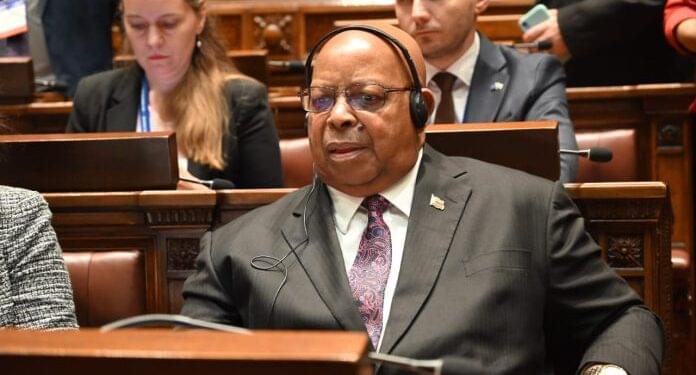The Speaker of the National Assembly, Advocate Jacob Mudenda says Parliaments must embrace Artificial Intelligence to be able to better respond to the demands of modern-day societies.
He was addressing the 2nd World Summit of the Committees of the Future 2023 in Uruguay.
“Today, we stand at the precipice of a new future for democracy and Parliaments. The future behoves us to rethink and reconfigure our minds towards firmly embracing artificial intelligence (AI) which wields transformative power on our Parliaments and democratic values,” noted Advocate Mudenda.
“Undeniably, the profundity of the influence of AI has become multifaceted and pervasive across all sectors of society. From health, education and finance, AI has emerged as a tool that has propelled these sectors to the future. But our Parliaments, must not be left behind. We cannot afford, not any minute longer, to let the wave of AI pass and leave us behind. It holds immense potential to positively transform our Parliamentary democracy to become one that transcends borders and unifies us in the pursuit of a common goal.”
Advocate Mudenda said where laws and policies were made without widespread consultations of the public, AI holds the potential to provide efficient platforms such as virtual town halls and AI-driven chatbots which can bridge the geographic and demographic divide.
He added, “Where laws and policies were made without adequate data and information, AI promises to facilitate effective evidence-informed policy-making through meticulously analysed data sets on trends, sentiments and other key indicators. Need I add that, where our Parliaments appeared to be unresponsive, AI, through real-time data analysis, can assist legislators to swiftly adapt policies and laws allowing for a more agile governance system closely aligned to the demands of our dynamic societies. I further opine that AI is the thread that will seamlessly bind the very fabric of accountability, transparency, good governance and inclusivity that anchor our current Parliamentary democracy systems.”
He however challenged delegates to consider the reality of cyber-security threats, especially when AI is adopted in electoral systems, which he said hold the potential to destroy economies, democratic processes and national security systems.
“Additionally, we should be cautious that AI does not perpetuate the existing inequalities, if access to the tools is limited or unevenly distributed between the public and the legislators.”
He said going forward, Parliaments must not shy away from the challenges that AI poses now and in the future.
“Instead, it is imperative that we face and embrace the AI challenges with utmost courage and conviction of realigning them for the public good. As AI continues to exert its expansive influence, our Parliaments must adapt and respond with resounding legislative effectiveness. The legislative and regulatory frameworks, meticulously formulated by our Parliaments, must govern the use of AI while simultaneously promoting and protecting the fundamental principle and heritage of ‘democratic equity’.”
He added, “Moreover, Parliamentarians and staff of Parliaments must be keenly attuned to the efficacious use of AI in discharging their mandate. This behoves us to continually educate, intellectually capacitate and upskill those charged with the mandate of upholding and furthering the ideals of Parliamentary democracy. I further posit that our Parliaments ought to encourage the pursuit of the value of ‘technology and AI multilateralism’ so that no one and no place is left behind,” Adv Mudenda said.
The African Commission on Human and Peoples’ Rights in 2021 adopted resolution 473, urging State Parties to address the implications for human rights of AI, robotics and other new and emerging technologies and work towards a comprehensive legal and ethical governance framework for AI application.
Enroute to Montevideo, Speaker Mudenda was met by His Excellency Ambassador Meshack Kitchen in Sao Paulo, Brazil, Zimbabwe’s Ambassador to the South American bloc specifically Brazil, Argentina, Bolivia, Chile, Colombia, Ecuador, Paraguay, Peru, Uruguay and Venezuela. Subsequently, the Speaker received a brief from the Ambassador covering various aspects of the host nation including its preparedness to host the current Summit.
The Summit is set to continue on the trajectory started in Finland in 2022 on the occasion of the First World Summit of the Committees of the Future held in Helsinki. Participating parliamentarians recognized the fundamental importance of incorporating the Future paradigm in present day use of AI.
Accordingly, they reached consensus on the need for sustained inter-parliamentary dialogue in order to address emerging global common AI positive impacts and attendant challenges.
The 2nd World Summit of the Committees of the Future 2023 is running under the overarching theme- BRINGING THE FUTURE TO THE PRESENT: THE DEMOCRACY OF THE FUTURE, ARTIFICIAL INTELLIGENCE (AI) AND PARLIAMENTS.
As the use of Artificial Intelligence (AI) in parliamentary processes becomes increasingly prevalent, it is necessary to establish ethical and operational guidelines that ensure accountability, transparency and human autonomy, while promoting sustainable development goals and protecting privacy, security and diversity.
AI can analyze complex legislative issues, identify patterns and make predictions based on historical data. This speed allows for faster decision-making in expediting parliamentary processes. However, human being parliamentarians bring experience, knowledge and the ability to consider ethical and moral aspects that AI may struggle with. They also provide a diverse range of perspectives and values, fostering debate and ensuring multiple viewpoints are considered.
Regarding these Parliamentary processes, the complex relationship between AI and human autonomy needs to be taken into account. Human autonomy is already threatened by existing technologies. The use of AI tools could enhance or decrease human autonomy, depending on how they are designed and which domains they are built to cover. The human element is an essential aspect of democracy. Human being parliamentarians possess empathy, emotional intelligence, and the ability to connect with constituencies on a personal level.
These qualities enable them to understand the needs and concerns of the people they represent, making them more relatable and responsive. AI, while efficient, lacks the ability to empathize or understand complex human emotions, limiting its capacity to fully represent the interests of diverse population. It is thus imperative to promote human autonomy and decision-making, including ensuring that parliamentary AI is used to supplement human capabilities rather than replace them.
However, artificial Intelligence (AI) has the potential to revolutionize parliamentary processes by improving efficiency and objectivity. Striking a balance between AI and human parliamentarians is essential to preserve accountability, democratic values and achieve effective and inclusive governance.
The Summit was officially opened on 25th September 2023 by the President of Uruguay, His Excellency, Mr Luis Lacalle Pou. The other high ranking dignitaries in attendance included Ms. Beatriz Argimón, Vice President of the Republic and President of the Senate of Uruguay, Mr. Sebastián Andújar Alvarez, President of the House of Representatives of Uruguay and Mr. Duarte Pacheco, President of the IPU.
Source ZBC News









